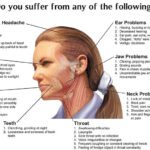TMJ is a dysfunction that can affect individuals of any age. It is a condition that forms when the Temporomandibular joint (the joint that associates the individual’s jawbone to their skull) does not work appropriately. A few people get affected on the two sides of their head, while others face issues just on one side.
Individuals who have TMJ can face a wide range of side effects. The absolute most fundamental is having a stiffened jaw, consistent ear pain, or a pain that won’t effectively leave without some sort of treatment. A lot of people have issues when they are eating since the pain is regularly created when they are eating their food. Others may have continuous and annoying headaches and they are normally difficult to treat and distinguish. Despite the fact that these are a part of the more typical side effects, there are different signs that have been reported by the patients that have this condition.
Sadly, there are numerous identifiable reasons for TMJ and they incorporate a bad bite, the grinding or clenching of teeth, different sorts of injuries or joint pain, the overuse of the jaw, and anxiety. These causes are considerably more likely to because of TMJ disorder.
As mentioned above, a bad bite is one of the primary reasons for TMJ, since the bad bit makes the individual put excess strain on their biting muscles. If this condition isn’t dealt with, the individual can suffer from a specific measure of pain alongside muscle spasm around their jaw region. These alignment issues can likewise cause the individual’s jaw sliding out of its socket.
The grinding and clenching of teeth can likewise cause this condition, particularly due to the fact that the grinding and clenching can wear away the person’s cartilage. Sadly, gritting of teeth typically happens when the individual is sleeping and they may not know that they are doing it.
Apart from grinding and clenching, arthritis too is one of the reasons for TMJ. Degenerative joint pain and osteoarthritis in the jaw zone are two sorts of joint pain that can cause TMJ, particularly due to the fact that they can make the jawbone to be dislocated.
Some dental and other medicinal techniques can be the reason behind TMJ. For example, if a patient needs to have a breathing tube embedded in their mouth, the jaw is normally fixed in a specific position for a prolonged measure of time. If this happens, the patient can experience the bad effects of the jawbone overuse and TMJ might be the outcome.
Additionally, Stress is listed as a common reason for TMJ. It is one of the major contributing factors as it can make a person unconsciously stiffen their facial and jaw muscles, at the same time as they are also gritting their teeth collectively.
Once the individual has distinguished the reason for TMJ, they can look for a feasible solution. This is an imperative step as the treatment that the individual gets depends on the root cause of the issue.









